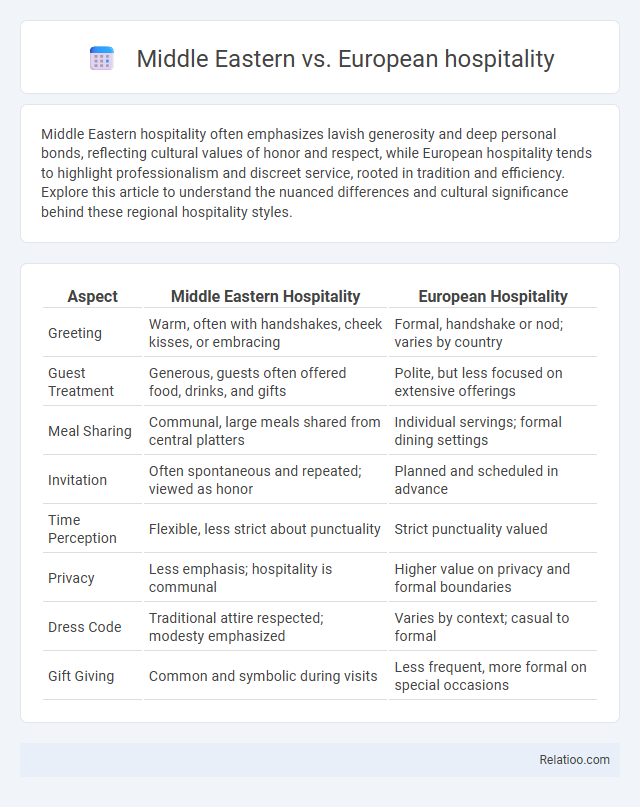Middle Eastern hospitality often emphasizes lavish generosity and deep personal bonds, reflecting cultural values of honor and respect, while European hospitality tends to highlight professionalism and discreet service, rooted in tradition and efficiency. Explore this article to understand the nuanced differences and cultural significance behind these regional hospitality styles.
Table of Comparison
| Aspect | Middle Eastern Hospitality | European Hospitality |
|---|---|---|
| Greeting | Warm, often with handshakes, cheek kisses, or embracing | Formal, handshake or nod; varies by country |
| Guest Treatment | Generous, guests often offered food, drinks, and gifts | Polite, but less focused on extensive offerings |
| Meal Sharing | Communal, large meals shared from central platters | Individual servings; formal dining settings |
| Invitation | Often spontaneous and repeated; viewed as honor | Planned and scheduled in advance |
| Time Perception | Flexible, less strict about punctuality | Strict punctuality valued |
| Privacy | Less emphasis; hospitality is communal | Higher value on privacy and formal boundaries |
| Dress Code | Traditional attire respected; modesty emphasized | Varies by context; casual to formal |
| Gift Giving | Common and symbolic during visits | Less frequent, more formal on special occasions |
Introduction to Middle Eastern and European Hospitality
Middle Eastern hospitality emphasizes generosity, warmth, and respecting guests as a cultural duty, often featuring elaborate rituals such as offering coffee or dates upon arrival. European hospitality varies widely across regions but generally prioritizes politeness, privacy, and efficiency, with formal greetings and reserved social interactions. Understanding these foundational differences aids in navigating etiquette expectations and fostering meaningful intercultural connections.
Historical Roots of Hospitality Traditions
Middle Eastern hospitality traces its roots to Bedouin culture, where generosity and protection of guests were essential survival traits in desert environments, fostering a deeply ingrained tradition of welcoming strangers with lavish meals and shelter. European hospitality evolved from medieval practices tied to religious institutions and feudal systems, emphasizing courtesy, ritualized service, and social hierarchy within taverns and inns. Your understanding of hospitality etiquette advances by appreciating these historical foundations, as Middle Eastern customs prioritize warmth and communal sharing, while European traditions stress formal manners and structured interactions.
Key Cultural Values Shaping Hospitality Practices
Middle Eastern hospitality emphasizes generosity, respect, and honor, often reflecting deep-rooted cultural values of welcoming guests with lavish offerings and warmth as a sign of social status and kinship. European hospitality tends to prioritize efficiency, formality, and privacy, where etiquette often involves polite greetings, reserved interactions, and structured hospitality settings aligned with cultural norms. Understanding these key cultural values can enhance Your ability to navigate and respect diverse hospitality practices effectively.
Guest Welcoming Rituals: Middle East vs Europe
Middle Eastern hospitality emphasizes elaborate guest welcoming rituals, including offering Arabic coffee, dates, and seating guests in a place of honor to show respect and generosity. In contrast, European hospitality prioritizes punctuality, polite greetings such as handshakes or cheek kisses depending on the country, and often a formal invitation to meals or events. Your understanding of these cultural differences ensures respectful and meaningful interactions when hosting or visiting guests in either region.
Food and Dining Etiquette in Both Regions
Middle Eastern hospitality places strong emphasis on generosity, where guests are often served abundant food such as lamb, rice, and dates, with the eldest or most honored guest eating first as a sign of respect. European dining etiquette varies by country but generally prioritizes formal table settings, polite conversation, and discreet use of cutlery, often following strict meal courses like appetizers, main dishes, and desserts. Both regions value respect and warmth, yet Middle Eastern dining etiquette often involves communal platters and sharing, while European etiquette typically centers on individual servings and more structured meal pacing.
Gift-Giving Customs and Social Expectations
Middle Eastern hospitality places a strong emphasis on generosity and lavish gift-giving, often involving elaborate presentations and symbolic items to demonstrate respect and honor. In contrast, European hospitality tends to focus on modest, thoughtful gifts, valuing practicality and personal taste without excess. Understanding these cultural nuances ensures your gift-giving aligns with social expectations, fostering positive relationships and avoiding unintended offense.
The Role of Family and Community in Hosting
Middle Eastern hospitality deeply emphasizes the collective role of family and community, where hosting is a shared responsibility that strengthens social bonds and honor. In European hospitality, the focus often lies on individual hosts or formal service settings, valuing personal privacy alongside courteous interaction. Understanding these cultural nuances enhances your ability to engage respectfully and meaningfully across diverse social contexts.
Hospitality in Business and Formal Settings
Middle Eastern hospitality in business and formal settings emphasizes generosity, extended greetings, and offering refreshments as a mark of respect and trust-building, often involving elaborate rituals that communicate sincerity and honor. European hospitality in similar contexts typically prioritizes punctuality, formal introductions, and concise gestures of politeness, reflecting efficiency and professionalism while maintaining warmth. Understanding and adapting to these regional hospitality etiquettes can foster stronger international business relationships and cultural respect.
Modern Influences on Traditional Hospitality
Middle Eastern hospitality is deeply rooted in generosity and elaborate rituals, emphasizing guest honor and communal sharing, while European hospitality often prioritizes privacy, formality, and refined service. Modern influences, such as globalization and digital communication, have introduced informal interactions and streamlined service standards across both regions, blending traditional warmth with contemporary convenience. Your experience will reflect a fusion of time-honored customs and modern etiquette, adapting hospitality to fast-paced, multicultural environments without losing cultural significance.
Conclusion: Comparing Middle Eastern and European Hospitality
Middle Eastern hospitality emphasizes generous, often extravagant gestures that reflect deep cultural values of honor and warmth, while European hospitality tends to prioritize formal etiquette and subtlety in service. Both traditions showcase a strong respect for guests, with Middle Eastern hospitality focusing on communal experiences and European practices highlighting refined manners and personal space. Your understanding of these key differences can enhance cross-cultural interactions and ensure respectful, meaningful exchanges in diverse social settings.

Infographic: Middle Eastern vs European hospitality
 relatioo.com
relatioo.com